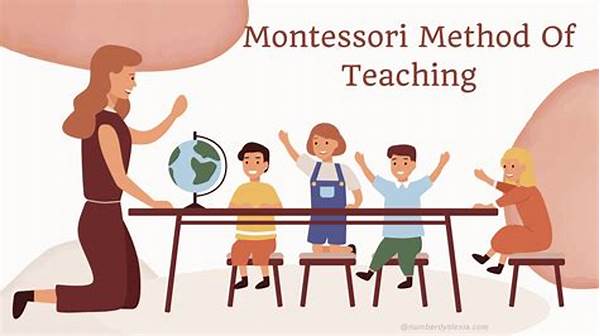Montessori Artinya: Discovering the World of Montessori Education
Read More : Why Montessori Is Gaining Popularity Among Parents
Imagine stepping into a classroom where children are not just students but curious explorers of knowledge. This is the essence of Montessori education, a methodology that has revolutionized the way we perceive learning. Originating from the insightful work of Dr. Maria Montessori, a trailblazer in the field of education, Montessori offers an environment where children lead the way in their learning journey. But what makes it so unique and compelling? Simply put, Montessori artinya freedom within limits, guiding children towards academic, social, and emotional growth independently.
Montessori classrooms are a vibrant fusion of creativity and self-discipline. The learners have the liberty to choose activities and work at their own pace within a structured environment. They learn by doing, experiencing a hands-on approach that instills a deeper understanding of concepts that traditional rote learning can’t match. In these classrooms, the teacher acts more as a facilitator than an instructor, watching over the progress while allowing self-discovery to flourish.
The beauty of Montessori education lies in its adaptability, making it suitable for children from varied backgrounds and learning capabilities. Through its unique blend of discipline, freedom, and creativity, children become not just learners but critical thinkers, problem-solvers, and responsible members of society. It is a system that nurtures innate curiosity and encourages lifelong love for learning, something every parent hopes for their child. Montessori artinya unlocking a child’s potential with a holistic approach.
The Core Principles of Montessori Education
At its heart, Montessori education is governed by key principles that redefine learning. The first is the emphasis on observation. Teachers take meticulous care to understand each child’s individual needs, thereby tailoring the learning experience. The second core principle is the prepared environment, where materials and activities are meticulously arranged to foster independence and learning. Montessori artinya creating an environment that respects each child’s pace.
—Discussion: The Effectiveness of Montessori Education
In today’s ever-evolving educational landscape, parents and educators are continuously searching for methods that not only educate but inspire. Montessori education often comes up in these discussions due to its distinct approach, emphasizing student autonomy and intrinsic motivation. Reflecting on its effectiveness, one might consider whether it truly prepares a child for the complex demands of the future. Montessori artinya developing individuals who possess both the knowledge and the soft skills required in a rapidly changing world.
Montessori supporters argue that this method cultivates creativity, self-discipline, and a genuine love for learning, pointing to numerous anecdotal success stories. Graduates of Montessori programs often highlight how their educational experience equipped them with the skills to tackle various life challenges. Nevertheless, critics question if this method meets the rigorous academic standards expected in traditional education systems, raising concerns about standardized testing and college readiness.
Research and studies have shown that Montessori students often excel in areas like critical thinking, social interaction, and problem-solving. Though, it is essential to explore how these benefits compare to traditional education. This invites a broader discussion on what education should achieve—should it merely provide knowledge or mold well-rounded individuals? Montessori artinya might require redefining our expectations from educational systems.
It is crucial to consider that while the Montessori method is not a one-size-fits-all solution, its elements can be effectively integrated into other forms of schooling. By blending Montessori principles with traditional methods, we could potentially create an optimal learning environment that combines the best of both worlds. Regardless of the approach, the ultimate goal should remain consistent: nurturing children’s natural curiosities to develop their full potential.
Implementing Montessori Principles in Conventional Classrooms
There’s an ongoing debate about the feasibility of embedding Montessori principles into more conventional settings. While complete transformation might not be plausible, selective integration could bring significant positive changes. Montessori artinya valuing children’s ideas and allowing flexible learning paths in classrooms traditionally driven by curriculums.
Evaluating Success: Montessori Beyond the Classroom
Besides academic performance, evaluating Montessori success requires an analysis of long-term impacts on personal and professional life. Former students often reflect on how skills like critical thinking and self-direction have permeated their lives. Montessori artinya learning beyond textbooks, embedding life skills that persist well into adulthood.
—Summarizing the Montessori Experience
To wrap up our exploration, let’s consider some key takeaways about Montessori education.
The Foundation and Future of Montessori Education
Montessori education is rooted in a profound understanding of child development, where learning is closely aligned with natural growth stages. Montessori artinya recognizing and nurturing the potential within each child. As we delve deeper into the 21st century, this method could hold the key to developing future leaders who are not just academically accomplished but also empathetic and adaptable.
Exploring modern educational landscapes, there’s evidence that Montessori education might just hold the answers to longstanding debates over traditional academic models. Could it be the answer we’ve been searching for or just another passing trend? Investing in a thorough understanding and adaptation of Montessori principles could redefine the future of education.
Montessori Methods in Action: Stories from the Classroom
Success stories from Montessori classrooms paint a vivid picture of self-empowered students leading their learning journeys. From young children mastering complex tasks at their own pace to teenagers tackling real-world challenges with confidence, Montessori artinya a dynamic and engaging education experience.
Ultimately, the effectiveness of education might not solely lie in the methodology but in its execution and adaptability to meet individual and societal needs. As we move forward, the conversation surrounding Montessori education offers a crucial insight into developing a robust educational approach for future generations.
